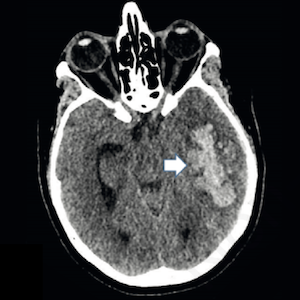Case Reports
Vol. 2 No. 2 (2023)
Long-term persistence of high anti-PF4 antibodies titer in a challenging case of AZD1222 vaccine-induced thrombotic thrombocytopenia

Publisher's note
All claims expressed in this article are solely those of the authors and do not necessarily represent those of their affiliated organizations, or those of the publisher, the editors and the reviewers. Any product that may be evaluated in this article or claim that may be made by its manufacturer is not guaranteed or endorsed by the publisher.
All claims expressed in this article are solely those of the authors and do not necessarily represent those of their affiliated organizations, or those of the publisher, the editors and the reviewers. Any product that may be evaluated in this article or claim that may be made by its manufacturer is not guaranteed or endorsed by the publisher.
Received: 19 March 2023
Accepted: 1 June 2023
Accepted: 1 June 2023
863
Views
263
Downloads
Similar Articles
- PO66 | Viscoelastic tests in disseminated intravascular coagulation associated with aortic aneurysm , Bleeding, Thrombosis and Vascular Biology: Vol. 4 No. s1 (2025)
- CO15 | Longitudinal coagulation profiling of individuals undergoing gender-affirming hormone therapy: the hyper-gender study , Bleeding, Thrombosis and Vascular Biology: Vol. 4 No. s1 (2025)
- PO69 | Whole blood thrombin generation hypercoagulable profile in a patient with hemolytic crisis due to paroxysmal nocturnal hemoglobinuria: a case report , Bleeding, Thrombosis and Vascular Biology: Vol. 4 No. s1 (2025)
- PO06 | Extracellular vesicles profiles in patients with porto-sinusoidal vascular disease , Bleeding, Thrombosis and Vascular Biology: Vol. 4 No. s1 (2025)
- PO83 | A case of deep vein thrombosis in a patient with systemic mastocytosis , Bleeding, Thrombosis and Vascular Biology: Vol. 4 No. s1 (2025)
- Ciarán Kennedy, Luke J. Conroy, Braden Millar, Monica de Gaetano, The subtle red line between combating and resolving inflammation in the cardiovascular disease, a “silent sniper” , Bleeding, Thrombosis and Vascular Biology: Vol. 4 No. 2 (2025)
- PO44 | Emicizumab in acquired haemophilia A , Bleeding, Thrombosis and Vascular Biology: Vol. 4 No. s1 (2025)
- PO40 | Management of paediatric patients affected by mild factor VII deficiency undergoing surgery , Bleeding, Thrombosis and Vascular Biology: Vol. 4 No. s1 (2025)
- PO41 | Comparison of the haemorrhagic phenotype between female and male patients affected by autosomal inherited bleeding disorders in a single-centre cohort , Bleeding, Thrombosis and Vascular Biology: Vol. 4 No. s1 (2025)
- PO27 | B-cell lymphoproliferative disorder and acquired coagulopathy: an insidious link , Bleeding, Thrombosis and Vascular Biology: Vol. 4 No. s1 (2025)
You may also start an advanced similarity search for this article.
Most read articles by the same author(s)
- Samantha Pasca, Cristina Santoro, Chiara Ambaglio, Marisanta Napolitano, Marta Milan, Letizia Natali, Silvia Nannizzi, Filippo Mori, Paolo Simioni, Ezio Zanon, Comparison among three different bleeding scores and the thrombin generation assay to assess the different hemorrhagic phenotypes in patients with FVII deficiency , Bleeding, Thrombosis and Vascular Biology: Vol. 1 No. 2 (2022)
- Daniela Poli, Walter Ageno, Emilia Antonucci, Salvatore Bradamante, Eugenio Bucherini, Paolo Chiarugi, Antonio Chistolini, Benilde Cosmi, Anna Falanga, Antonio Insana, Domenico Lione, Rosa Maria Lombardi, Giuseppe Malcangi, Rossella Marcucci, Giuliana Martini, Lucilla Masciocco, Carmelo Paparo, Daniele Pastori, Simona Pedrini, Vittorio Pengo, Pasquale Pignatelli, Andrea Toma, Sophie Testa, Gualtiero Palareti, Management of anticoagulation in atrial fibrillation patients in Italy: insight from the Atrial Fibrillation-Survey on Anticoagulated Patients Register (AF-START) , Bleeding, Thrombosis and Vascular Biology: Vol. 2 No. 2 (2023)
- Anna Falanga, Hugo Ten Cate, Bianca Rocca, How to manage antithrombotic treatments in thrombocytopenic patients with cancer. Comments on the European Haematology Association guidelines , Bleeding, Thrombosis and Vascular Biology: Vol. 2 No. 1 (2023)
- Anna Falanga, Benjamin Brenner, Alok A. Khorana, Welcome to the 12th International Conference on Thrombosis and Hemostasis Issues in Cancer! , Bleeding, Thrombosis and Vascular Biology: Vol. 3 No. s1 (2024)
- Eleonora Petito, Anna Maria Mezzasoma, Emanuela Falcinelli, Chiara Conti, Erica De Candia, Raimondo De Cristofaro, Silvia Sorrentino, Gian Marco Podda, Mariangela Scavone, Anna Falanga, Marina Marchetti, Luca Barcella, Stefania Basili, Lucia Stefanini, Andrea Boccatonda, Laura Contino, Patrizia Sciancalepore, Igor Florio, Egidio Imbalzano, Rossella Marcucci, Angela Rogolino, Patrizia Noris, Marta Panella, Rita Santoro, Maria Costanza Turi, Gaetano Vaudo, Rosa Curcio, Paolo Gresele, Persistence of functional anti-PF4 antibodies and neutrophil activation in vaccine-induced immune thrombotic thrombocytopenia , Bleeding, Thrombosis and Vascular Biology: Vol. 4 No. 3 (2025)






